Naija Cuisine
Discover the Richness of Nigerian Cuisine.
Nigerian cuisine is more than just food, it’s a celebration of culture, history, and community. With bold flavours, vibrant colours, and time-honoured techniques passed down through generations, each dish tells a story of resilience, creativity, and deep cultural roots.
From the smoky depth of jollof rice to the soul-warming egusi soup, the satisfying chew of pounded yam, or the spice-kissed sweetness of suya, Nigerian food offers a wide range of experiences for every palate, mild or adventurous, vegetarian or meat-loving, traditional or modern.
Catering Menu
How to prepare Amala, Gbegiri and Ewedu
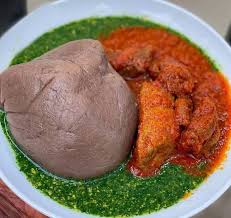
Amala
Source: Made from yam flour (elubo) or sometimes plantain flour.
Health Benefits:
High in fiber – helps digestion.
Contains complex carbohydrates – provides sustained energy.
Low glycemic index (especially plantain amala) – good for blood sugar control.
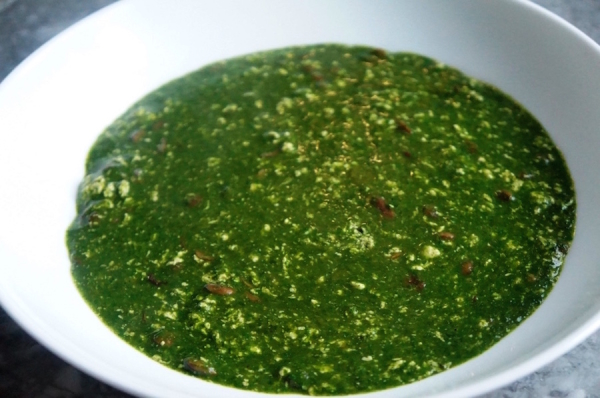
Ewedu
Source: Made from jute leaves, cooked and blended into a slimy soup.
Health Benefits:
Rich in vitamins A, C, and E – supports vision and immunity.
High in antioxidants – helps reduce inflammation.
Supports gut health due to its mucilaginous (slippery) nature.

Gbegiri
Source: Made from peeled brown or black-eyed beans, blended and cooked into a smooth soup.
Health Benefits:
High in plant-based protein – supports muscle and tissue repair.
Good source of fiber – promotes heart and digestive health.
Contains B vitamins – helps energy production.
How To Cook Smoky Party Jollof Rice

Eba
Source: Made from garri (processed cassava flakes) mixed with hot water to form a dough.
Health Benefits:
Energy-dense due to carbohydrates.
Contains resistant starch – supports digestive health.
Gluten-free – suitable for people with gluten sensitivity.

Iyan (Pounded Yam)
Source: Made by pounding boiled yam until it forms a stretchy dough.
Health Benefits:
Rich in complex carbs – provides long-lasting energy.
Contains potassium – helps regulate blood pressure.
Low in fat and cholesterol-free.
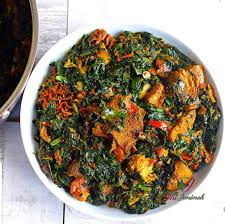
Efo Riro
Source: A rich vegetable soup typically made with spinach or fluted pumpkin leaves, mixed with tomatoes, peppers, and assorted meats or fish.
Health Benefits:
Packed with iron and folate – helps blood production.
Rich in fiber – aids bowel movement and heart health.
Contains vitamins A and C – boosts immune function.
How to cook Egusi soup
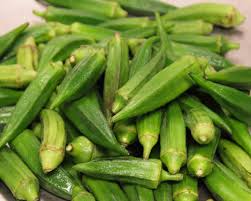
Ila (Okro Soup)
Source: Made from okra (lady’s fingers), often cooked with palm oil, meat, fish, and spices.
Health Benefits:
High in fiber and mucilage – promotes gut health.
Contains vitamin K – essential for blood clotting.
Supports eye health due to vitamin A content.
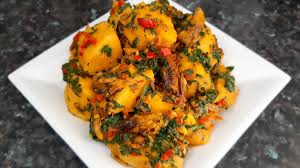
Asaro (Yam Porridge)
Source: Made from boiled yam chunks cooked in a rich tomato and pepper sauce, often with palm oil, onions, and fish or meat.
Health Benefits:
Balanced dish – combines carbs, fats, and protein.
Contains beta-carotene (from palm oil) – good for vision and skin.
Offers energy and satiety – great for active lifestyles.
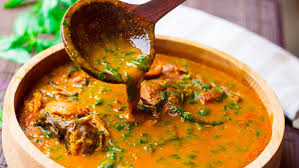
Ogbono Soup
Source:
Prepared using ground ogbono seeds (wild mango seeds), cooked in a savory blend of palm oil, stock, assorted meats or fish, and leafy vegetables. Known for its rich, thick, and slightly slimy texture.Health Benefits:
Rich in Healthy Fats: Ogbono seeds are high in monounsaturated fats, which support heart health and help manage cholesterol.
Supports Weight Management
How to make ogbono and okro soup
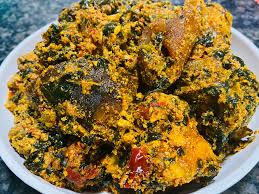
Egusi
Source:
Made from ground melon seeds (egusi), this beloved soup is thickened with palm oil and often cooked with leafy vegetables, assorted meats or fish, and rich seasonings. It’s a staple in many Nigerian homes and is commonly paired with pounded yam, eba, or fufu.
Health Benefits:
Protein-Packed: Egusi seeds are rich in plant-based protein, making this soup filling and muscle-supportive—especially when combined with animal protein.
High in Healthy Fats: Contains unsaturated fats that support brain and heart health.
Nutrient Dense: Loaded with magnesium, iron, and zinc—key for energy, immunity, and cell repair.
Good for Skin and Hair: Egusi is a natural source of vitamin E and antioxidants, which promote healthy skin and hair.
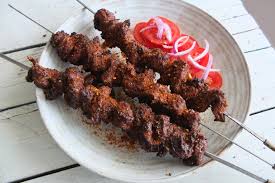
Suya
Source:
A Northern Nigerian delicacy, Suya is made from thinly sliced beef, chicken, or ram, marinated in a spice blend (often including ground peanuts, ginger, cayenne, and paprika), then grilled over open flame and served with onions and pepper.Health Benefits:
Lean Protein: Provides high-quality protein for muscle maintenance and energy.
Spice-Powered: Ingredients like ginger, garlic, and chili aid digestion and have anti-inflammatory properties.
Low-Carb Option: Great for those watching their carb intake—perfect for keto or paleo-friendly diets.
Contains Healthy Fats: The peanut-based marinade adds healthy fats that support heart and brain function.

Cat Fish BBQ
Source:
Fresh catfish marinated in a blend of spices, peppers, and sometimes herbs, then charcoal-grilled to smoky perfection. Often served with spicy pepper sauce and sides like plantains or vegetables.Health Benefits:
Rich in Omega-3s: Catfish is a great source of omega-3 fatty acids, which support heart health and brain function.
High-Quality Protein: Ideal for muscle building, repair, and satiety.
Low in Calories and Carbs: Grilling keeps the dish light while preserving flavor—perfect for healthy eating plans.
Mineral Rich: Packed with phosphorus and selenium for bone strength and antioxidant protection.

For Non-Nigerians
We invite you to explore Nigerian food and let Favourite Food Stuff be your plug, Either you want it in cooked or uncooked. Nigerian food is not just about spice—it’s about depth. It’s about balance. And most importantly, it’s about joy.
If you love flavourful stews, perfectly cooked grains, slow-cooked meats, plant-based delights, or tropical ingredients, you’ll find something unforgettable in Nigerian cuisine.
Taste it. Share it. Celebrate it.
Because once you try it, you’ll understand why millions can’t get enough of it.
or Contact us Today on admin@favouritefoodstuff.com
